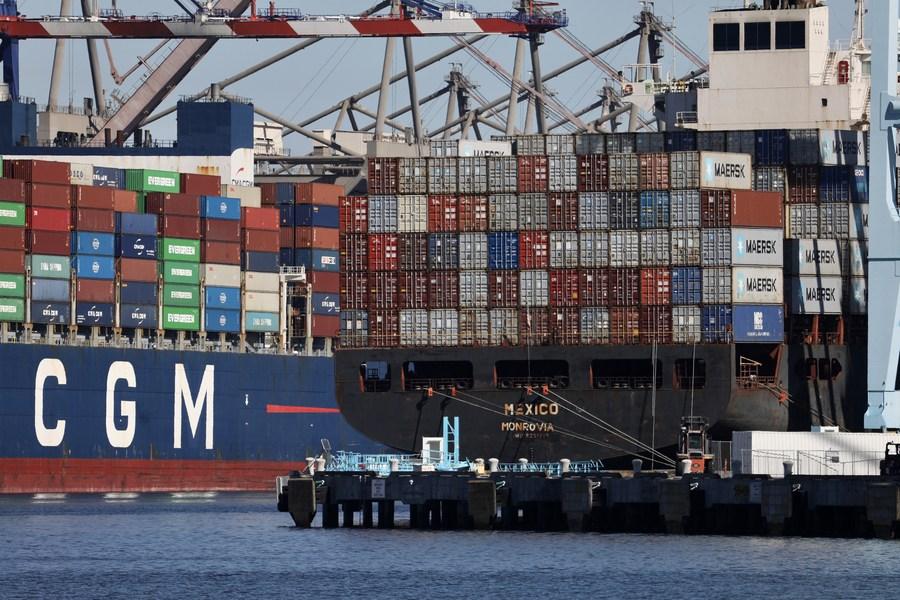
Fully loaded container ships are seen at the port of Los Angeles, California, the United States, Oct 29, 2021. [Photo/Xinhua]
This is an editorial from China Daily.
The Office of the United States Trade Representative is expected to make a final decision by the end of the month on its proposal to increase Section 301 duties on Chinese products in industries Washington has identified as strategic. The increases were originally scheduled to be phased in from Aug 1, as the White House believes the imposition of tariffs under section 301 of the Trade Act "have been effective in encouraging China to take positive steps in addressing the issues identified in the section 301 investigation, such as certain revisions in its foreign investment and administrative licensing laws". But the duties have been postponed due to dissenting voices from US business communities.
Economic and trade relations with China have been politicized to such an extent that any sign of perceived weakness may be politically problematic ahead of the upcoming presidential election As such, a decision not to go ahead with the tariff hikes would not be easy at such a point. Since it is the option least likely to have any blowback, campaigning in US elections has degraded into a China-bashing competition such that neither candidate can afford to give the impression they do not dare to take on China.
First it was US President Joe Biden striving to present a tough line against China in response to Republican candidate Donald Trump's allegation that he was "weak" on China. Now that he has passed the torch to Vice-President Kamala Harris, the latter finds herself under tremendous pressure to build a tougher image than the sitting commander-in-chief. Mike Johnson, the Republican House speaker, has openly challenged her in that regard, claiming "The only person that our adversaries fear less than Joe Biden is Kamala Harris". While Trump, in his words, has boasted that he is the only one who elicits fear in Washington's purported adversaries.
With Democratic candidate Vice-President Harris being attacked by Trump and his loyalists for her lack of experience in economic and foreign affairs, she is under mounting pressure to lay out clearly defined economic and diplomatic priorities to fend off the barbs.
But while there is a great temptation to bow to the populist impulses and play the Trump game to showcase toughness, much of the economic woes the US faces today have actually derived from such impulses and a disregard for the economic reality and market rules.
As many coolheaded US economists and business insiders have correctly pointed out, it is not doing business with China, but rather refusing normal economic and trade dealings with China that has led to the US' current troubles.
Decades of healthy, brisk China-US economic and trade ties are indisputable proof that both economies prosper when they deal with each other following market rules and transcend ideological stereotypes and constraints. What we see today is almost the worst-case scenario between the world's two largest economies. The previous model in which China served as the world's, and in particular the US', manufacturing base and consumer market, was never, as some US politicians have sought to portray, one-sidedly benefiting China alone. US businesses and consumers both found themselves better off thanks to cost-effective Chinese exports and the two countries' mutually beneficial economic interdependence. Just as many have suggested, removing the trade barriers against China alone may significantly assuage the pain consecutive years of high inflation have inflicted on US businesses and consumers.
As Harris is widely believed to be trying to distance herself from the economic policies of both Trump and Biden. She is reportedly seeking to present her economic agenda as more ambitious and forward-looking, and "laser-focused on creating opportunities for the middle class". If that truly is her priority, she only needs to face the economic reality and demonstrate basic economic common sense to make a difference.
A pragmatic, less-politicized economic and trade relationship with China will go a long way to acting as the tonic the US economy needs.

 中文
中文



